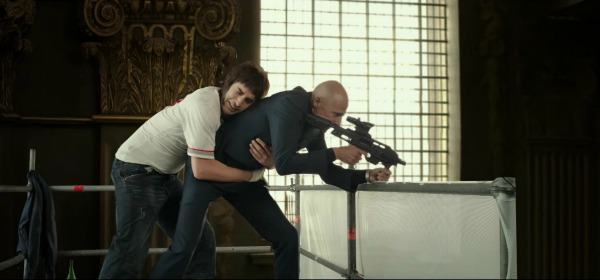THE BROTHERS GRIMSBY: An Outdated And Elitist Social Satire

Alistair is a 25 year old writer based in Cambridge.…
It’s no secret that Sacha Baron Cohen makes comedies that age badly, no matter how well-regarded they are upon their release. His reputation as a satirist with his finger on the pulse of contemporary societal prejudices ensures that days and weeks after initial release they become regarded as documents of America’s unforgivable past.
With Grimsby, Cohen makes his first British movie in fourteen years, after his execrable debut Ali G In Da House – and it is the first time his brand of social satire feels not just outdated, but tired prior to release.
A film that “punches down” to the working classes
Cohen stars as Nobby, a drunken layabout with nine kids, no job and a ton of dole money – largely from shaving his son’s head and pretending he has leukaemia. His long lost brother (Mark Strong), who he separated from 28 years earlier, has been tracked down in London; the only catch is he’s now a black-ops spy for MI-6, whose missions are compromised once the obnoxious Nobby integrates himself into his life. Suggesting he lay low in Grimsby after the president of the WHO is killed, Nobby decides to tag along his brother’s mission and become an inept super spy.
Unlike many of the randomly-chosen nations from where his characters hail, the well-humoured folk in the North of England would welcome the comic actor with open arms. The only problem is that he has made a film that is distinctively elitist, Cohen is a middle-class man looking down on the working classes and never attempting to characterise them as anything other than “scum”.
When his character Nobby makes a rousing-speech near the film’s close, reminding his friends that the working classes helped create everything great about British society (namely the NHS), it feels disingenuous. This message contradicts the film’s portrayal of every single working class person as a benefits-scrounging, drug addicted waste of space – and equally contradicts the working class’s return to being the butt of the joke seconds later.

Cohen is a smart man, but this feels conceived by a person who decided to satirise the portrayal of the lower classes by the British tabloid press, but merely gave them more ammunition to criticise them with. In The Dictator, Cohen’s character gives a speech about how in a democracy “politicians get poor people to vote against their own self-interests”. By producing this Daily Mail-readers nightmare, whilst suggesting that the only character who had a good life did so by getting out of Grimsby, all he is doing is inciting the rise of the aspirational middle class – the desired core audience of the Conservative Party who will look down on these characters with disgust.
Of course, all viewers are supposed to find these characters disgusting, but the politicised message behind the film makes it difficult for a working class viewer to take. This is, after all, a man born middle class and now an A-list celebrity punching down at those with a low economic income – a life experience he wouldn’t know the reality of.
Elsewhere, the movie feels outdated due to overused pop culture gags. Within Grimsby, there are jokes about 2 Girls 1 Cup, Gangnam Style and Bill Cosby. The most contemporary joke is a sight gag involving Donald Trump, presumably added days before release due to the poor visual effects used to incorporate his likeness into the movie. The movie was supposed to be released in July 2015, meaning that the sole relevant joke wouldn’t have even been included were that release date kept.
This isn’t to say it is without laughs, but here the only chuckles are generated by the scenes that withhold satire altogether and go fully scatological – it is a rare case of a film that would have more dignity if it didn’t have any pretensions towards being something other than lowbrow.
A film ugly in more than just its politics
I still felt guilty for laughing at this film, not because I’m a comedy snob who feels above crass humour, but because the jokes don’t feel earned due to the poor quality of the film surrounding them. To its credit, Grimsby does push the envelope of on-screen grotesqueness in comedy to new extremes – the phrase “elephant bukake” is not one I was ever expecting to write down, let alone have witnessed, with Mark Strong being covered in a vat of elephant semen.
These sequences are undermined by frequently falling back on tired “gay panic” jokes, which feels pointless due to all having overtly incestuous themes; a smarter screenplay would note the hypocrisy of the character that incest is less of an issue than homosexuality. For the first time since his last British movie, Cohen doesn’t even bother trying to take a deeper strike at a societal prejudice (one which is coincidentally far less persistent in British society and feels like a pointless attempt at provocation); merely adding a tired joke about Grindr and moving swiftly on to the next scene.

Reviewing comedy is a difficult task, as humour is subjective, but with Cohen’s stated desire to make an action-comedy that compromises on neither element, the film is an absolute failure. Director Louis Leterrier’s previous film Now You See Me was so rife with plot holes its apologists argue that it deliberately set out to make no sense. The plot holes equally run rampant here, starting from the opening minutes: Nobby tracks down his brother via a mutual acquaintance apparently seeing him in the street and somehow getting a ticket to an event he is going to be at.
It is a nonsensical coincidence that the film doesn’t bother explaining; it should be taken as a given that a Leterrier film has lazy screenwriting, with no directorial intervention to the screenplay to change it into anything remotely coherent (or at least believable). The action sequences equally look cheap and incoherent, taking a first-person approach that makes everything on-screen look indistinguishable.
The most unforgivable aspect is hiring a French action director to make a satire on British culture, specifically the culture of the North. Cohen’s character deliberately looks like Oasis singer Liam Gallagher, which would be a contemporary joke were this released two decades earlier, whilst the soundtrack is comprised entirely of songs from the nineties. Aside from the dating nature of the film, it is tone-deaf to the minute details; the town of Grimsby is introduced to the sounds of “Parklife” by Blur.
The Britpop North Vs. South war of the nineties, that pitted Blur against Oasis, makes it strange that a song very distinctively about London (from a band who were jokingly reviled in the North) is used, especially when it permeated British pop-culture significantly during that decade. With Liam Gallagher informing the look of Cohen’s character, it makes no sense why an entirely contradictory music cue has been used.
Conclusion
The central narrative bears more than a passing resemblance to that of Kingsman: The Secret Service, which also starred Strong. I may have been a rare dissenter of that film, for feeding what I believe are Tory values to the working classes as well as being cheaply executed, but in comparison with the bargain-basement production values and contradictory politics of Grimsby, it looks like a misjudged masterpiece.
The spy-comedy sub-genre is becoming overcrowded of late, and Grimsby earns its place rightfully at the bottom of the pile. Delivering neither on engrossing action or effective satire, this mess is Cohen’s worst film to date.
What are the biggest comedy flops of recent years? And is the satire of Grimsby more effective than I have given it credit for?
Grimsby is out now in the UK and is released in the US as The Brothers Grimsby on March 11. All international release dates can be found here.
Does content like this matter to you?
Become a Member and support film journalism. Unlock access to all of Film Inquiry`s great articles. Join a community of like-minded readers who are passionate about cinema - get access to our private members Network, give back to independent filmmakers, and more.
Alistair is a 25 year old writer based in Cambridge. He has been writing about film since the start of 2014, and in addition to Film Inquiry, regularly contributes to Gay Essential and The Digital Fix, with additional bylines in Film Stories, the BFI and Vague Visages. Because of his work for Film Inquiry, he is a recognised member of GALECA, the Gay & Lesbian Entertainment Critics' Association.













